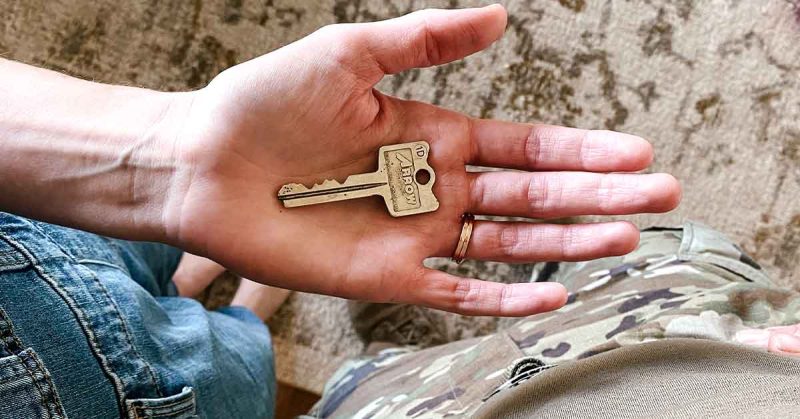Many looked at us like we had three heads when we told them we were buying a house.
In this market? Why don’t you wait until things cool off? The housing market is about to crash!
We’d heard all sorts of things about the market — but the reality was that we didn’t have many other options than to buy. As a military family, we are told when to move, and so we had to take the housing market however it was — even if it was January of 2022 — just recently marked the most competitive month in housing-market history.
I’ll admit, as first-time buyers (or as buyers in general), there is a lot that is not ideal about the current housing market. Most homes are being sold in as is condition. Buyers are finding it almost impossible to get a decent home without taking some financial risks — whether it be offering way over appraisal, leaving out financial or inspection contingencies to make competitive offers, and/or risking major issues with inspection that sellers most likely won’t agree to fix.
We would have loved to avoid the 2022 buyer frenzy, the stress of low inventory, the financial disadvantages of the seller’s market, the impossible competition … but we felt it was our best option to dig our heels in and pray hard that something would work out. I’m not going to go into detail here, but the on-post housing, as well as the rental market at our next duty station, were not going to be feasible for us for a few significant reasons. It took us two very devoted months of intensive searching and trying to get a house. My husband and I are both stereotypical oldest children, and probably approached the process with more-than-average caution. There were many times we almost gave up, but we never did — because we knew we didn’t really have a great alternative.
After just going through this process and finally ending up with a wonderful home after a not-so- wonderful process, I thought I’d share some tips that helped us out.
Find a good realtor
This is hands-down the most important thing in finding a home. In our experience, it’s best to get word-of-mouth suggestions from people you trust; but if you don’t have any connections, there are helpful resources online that can point you to a good realtor in the area.
When working with a realtor, you should make sure they are responsive and willing to go above and beyond to answer questions and investigate things for you. They should be patient and positive. They may be pushy at times but should be respectful of your boundaries. They should base their searches off your criteria, but also give you a reality check as needed. As first-time buyers in this particular market, we started out with our heads in the clouds a bit, but our realtor helped bring us down and give us some realistic options and strategies that would work with our particular needs and budget. Once you have a realtor you can trust, you will give your list of needs and wants and cash usage limit, and then trust they can use that information to take care of the rest.
Visit the area in person
While it’s unavoidable at times, no one wants to buy a home “sight unseen.” As a military family, you are most likely not within driving distance from your next duty station and will need to schedule a flight to the area at some point early in the house-hunting process, and possibly, child care. Even if you don’t end up making any offers while you’re visiting, you can at least get a feel for the different areas and narrow down the places you’d like to live.
One important tip: If you do buy sight unseen, it might be best to focus on homes in neighborhoods with HOAs so you at least have the assurance there are no absurd landmarks outside your home (and never will be) that will hinder you from selling in the future. In a neighborhood with an HOA, you can at least know the homes and yards are cared for and will make a pleasant place to live for your future prospective buyers.
Discuss finances before beginning the offering process
If you have a good realtor, one of their questions to you should be the amount of money you have to “play around with,” meaning, cash you have to use beyond covering the basic things like closing costs and inspection fees. This is money they will use to help structure your offers. It is important to discuss this with your spouse ahead of time, so both of you come to an understanding of the number you are willing to give and not exceed. Once you enter the competition of placing offers, it will be tempting to raise your number — but this can put you in a financially-compromised situation if you take that too far. We found it best to give our realtor a firm “budget” and let them play around with the numbers and structure our offers how they saw best fit.
One strategy that worked well for us was looking at homes that met our needs but were under our budget. In this market, sellers are repairing little to nothing — and it is usually near impossible for a buyer to back out of an offer without losing a serious amount of money. This can leave buyers moving into a home with huge repairs needed (i.e., new roof or heating, ventilation and air conditioning system, etc.). My husband and I made sure to get a home that was under our budget to allow a “buffer” with our remaining Basic Housing Allowance to finance repairs, if needed.
When deciding your cash budget together, you should be anticipating the worst-case scenario with inspection results and appraisal and be prepared for it. Knowing you can afford significant repairs or pay the cash you offered out of pocket will help you not lose sleep at night while you wait for those answers. This isn’t ideal in any way, but it’s the reality of this market.
Be realistic
We certainly went into the buying process as the classic first-time buyers with rose-tinted glasses, but those lenses quickly turned foggy and dull as we entered this particular market everyone had warned us about.
Our realtor gave us a reality check a few times that wasn’t ever fun to hear, but we knew was necessary. She eventually talked us into accepting things we didn’t want to. The unfavorable realities in this market such as the willingness to buy sight-unseen, taking on a house that needed some repairs, jumping on a home in “coming soon status” and offering more cash than we’d initially wanted to.
Another helpful piece of advice from our realtor that really stuck with us was what was called the “80-10-10 rule.” Plan on loving 80% of the house, changing 10% and accepting the other 10% that you don’t love but can’t change.
Be strategic and creative with your offers
Some strategies that worked for us in finally getting an accepted offer were offering random numbers. For instance, instead of offering $5k in due diligence and $10k over appraisal, you could offer $7k in due diligence and $11k over appraisal. That way, you have a slight edge over others who are offering similar numbers to you in more conventional increments.
Another thing we did was offer to pay partial seller’s closing costs. This not only helped increase sellers’ net-gain (their end goal) by having them pay less out of pocket, but also showed a nice gesture to help with their costs.
Lastly…be patient! Go into the process knowing you most likely won’t get the first house you try for. It will probably take at least two or three, if not more, offers before you get a home. Of course, if you are attempting to get a home “out of your league,” you may be trying for a while. Or if you are taking on an older project home, you may not have to make multiple offers. It’s a pretty safe rule of thumb that the more work you are willing to do to a house, the less money you’ll need to offer up.
We finally close on our home this week. We got exactly what we needed — even if it wasn’t the brand-new turnkey home with granite counter tops and stainless-steel appliances I’d imagined. But it’s a charming, practical home that meets our needs, and more. With patience and determination (and a great realtor), we can finally say we bought our first home, and in one of the craziest times in housing-market history!





